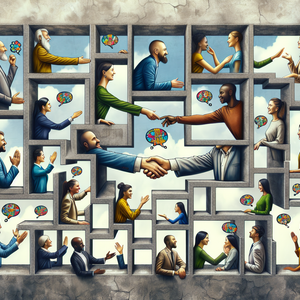The Role of Diversity and Inclusion in Shaping OSF Careers

Representation matters. When individuals from varied backgrounds—including different races, genders, ages, sexual orientations, and abilities—are present in the workplace, they bring unique perspectives that can lead to innovative solutions and ideas. Research consistently shows that diverse teams outperform their homogeneous counterparts, as they are better equipped to tackle complex problems due to their varied viewpoints. For instance, a study by McKinsey & Company found that companies in the top quartile for gender diversity on executive teams are 21% more likely to experience above-average profitability. This statistic underscores the critical link between diversity and business success, making a compelling case for OSF organizations to prioritize D&I in their hiring and development practices. In the realm of open-source projects, diverse contributors can help create software that addresses the needs of a broader audience, ensuring that products are usable and beneficial for all.
Best Practices for Promoting D&I in OSF Careers
1. **Inclusive Hiring Processes**: To cultivate a diverse workforce, OSF organizations must first examine their hiring practices. This includes broadening recruitment channels, utilizing blind resume reviews, and ensuring diverse interview panels. By actively seeking out candidates from various backgrounds, organizations can build a more inclusive talent pool. For example, platforms like GitHub and GitLab can be leveraged to identify and engage with diverse contributors in the open-source community. 2. **Employee Resource Groups (ERGs)**: Establishing ERGs can provide support and community for underrepresented groups within the organization. These groups can serve as a space for networking, mentorship, and professional development, empowering members to advance their careers while fostering a sense of belonging. In the OSF context, ERGs can focus on specific areas like women in tech, LGBTQ+ issues, or cultural diversity, creating a supportive ecosystem for diverse contributors. 3. **D&I Training Programs**: Regular training on unconscious bias, cultural competency, and inclusive leadership can equip employees with the tools needed to create a more equitable workplace. Such training can help individuals recognize their biases and understand how to foster an inclusive environment that values diverse contributions. OSF organizations can utilize online platforms to provide accessible training resources to all employees, ensuring that everyone is equipped to contribute positively to a diverse workplace. 4. **Mentorship and Sponsorship Programs**: Pairing underrepresented employees with mentors or sponsors can provide invaluable guidance and opportunities for career advancement. These relationships can help navigate the complexities of career progression and open doors that might otherwise remain closed. In the OSF environment, experienced contributors can mentor newcomers, helping them to navigate the open-source landscape and encouraging their growth within the community.
The Benefits of Diverse Teams
The advantages of diversity extend far beyond enhanced creativity and innovation. Diverse teams can also improve employee satisfaction and retention, as individuals feel valued and included. Moreover, organizations that prioritize D&I tend to attract top talent, as today’s workforce increasingly seeks employers who reflect their values. A case in point is the tech giant Google, which has made significant strides in promoting diversity within its workforce. By implementing comprehensive D&I initiatives, Google has not only improved its workplace culture but has also enhanced its reputation as an employer of choice. In doing so, they have created a more dynamic and innovative environment, leading to groundbreaking products and services. Similarly, OSF organizations that prioritize D&I can create a welcoming atmosphere that encourages collaboration and innovation among diverse contributors.
The role of diversity and inclusion in shaping OSF careers cannot be overstated. As organizations strive to navigate the complexities of the modern workforce, embracing D&I initiatives will be crucial for driving innovation, enhancing employee satisfaction, and achieving long-term success. By prioritizing representation, implementing best practices, and fostering a culture of inclusivity, OSF organizations can not only enrich their workplace but also empower their employees to thrive. In a world where diverse perspectives lead to stronger outcomes, the path forward for OSF careers is clear: diversity and inclusion are not just advantageous—they are essential. Organizations that embrace D&I will not only enhance their internal culture but will also contribute to a more equitable and innovative open-source community, ultimately benefiting everyone involved.
Diversity and Inclusion Specialist
Large tech companies (e.g., Google, Microsoft), non-profits, and educational institutions
Core Responsibilities
Develop and implement D&I strategies to foster an inclusive workplace culture.
Conduct training sessions on unconscious bias and cultural competency for all employees.
Analyze and report on D&I metrics, recommending improvements based on data.
Required Skills
Strong understanding of D&I best practices and legal compliance.
Excellent communication and interpersonal skills to engage with diverse groups.
Experience in data analysis and reporting on diversity metrics.
Community Engagement Manager (Open Source)
Open-source foundations, tech startups, and community-focused organizations
Core Responsibilities
Build and maintain relationships with diverse contributors in the open-source community.
Organize events and workshops to promote inclusivity and representation in open-source projects.
Develop outreach strategies to engage underrepresented groups in tech.
Required Skills
Proven experience in community organizing or engagement, particularly within tech.
Familiarity with open-source platforms and contributor networks.
Strong organizational skills and the ability to work collaboratively across teams.
Technical Recruiter (Focus on Diversity Hiring)
Recruitment agencies, tech companies, and diversity-focused organizations
Core Responsibilities
Design and implement innovative recruiting strategies to attract diverse talent.
Collaborate with hiring managers to ensure inclusive job descriptions and interview processes.
Conduct workshops for interview panels on bias reduction and inclusive hiring practices.
Required Skills
Experience with recruiting in tech, particularly in open-source environments.
Knowledge of D&I issues and metrics in hiring practices.
Strong networking skills to engage with diverse talent pools.
User Experience (UX) Researcher (Diversity Focus)
Tech companies, UX consulting firms, and research organizations
Core Responsibilities
Conduct research to understand the needs and experiences of diverse user groups.
Analyze user feedback to inform product development and enhance accessibility.
Collaborate with design teams to create inclusive user interfaces and experiences.
Required Skills
Proficiency in qualitative and quantitative research methods.
Experience in usability testing, particularly with diverse populations.
Strong analytical skills to translate user insights into actionable design changes.
Employee Resource Group (ERG) Coordinator
Corporations with established ERGs, educational institutions, and non-profit organizations
Core Responsibilities
Facilitate the formation and activities of ERGs within the organization to support underrepresented groups.
Organize events, training, and networking opportunities to promote inclusivity.
Serve as a liaison between ERGs and organizational leadership to advocate for group needs.
Required Skills
Strong leadership and organizational skills to manage multiple ERG initiatives.
Excellent communication skills to connect with diverse employee groups.
Experience in program management and community building.


